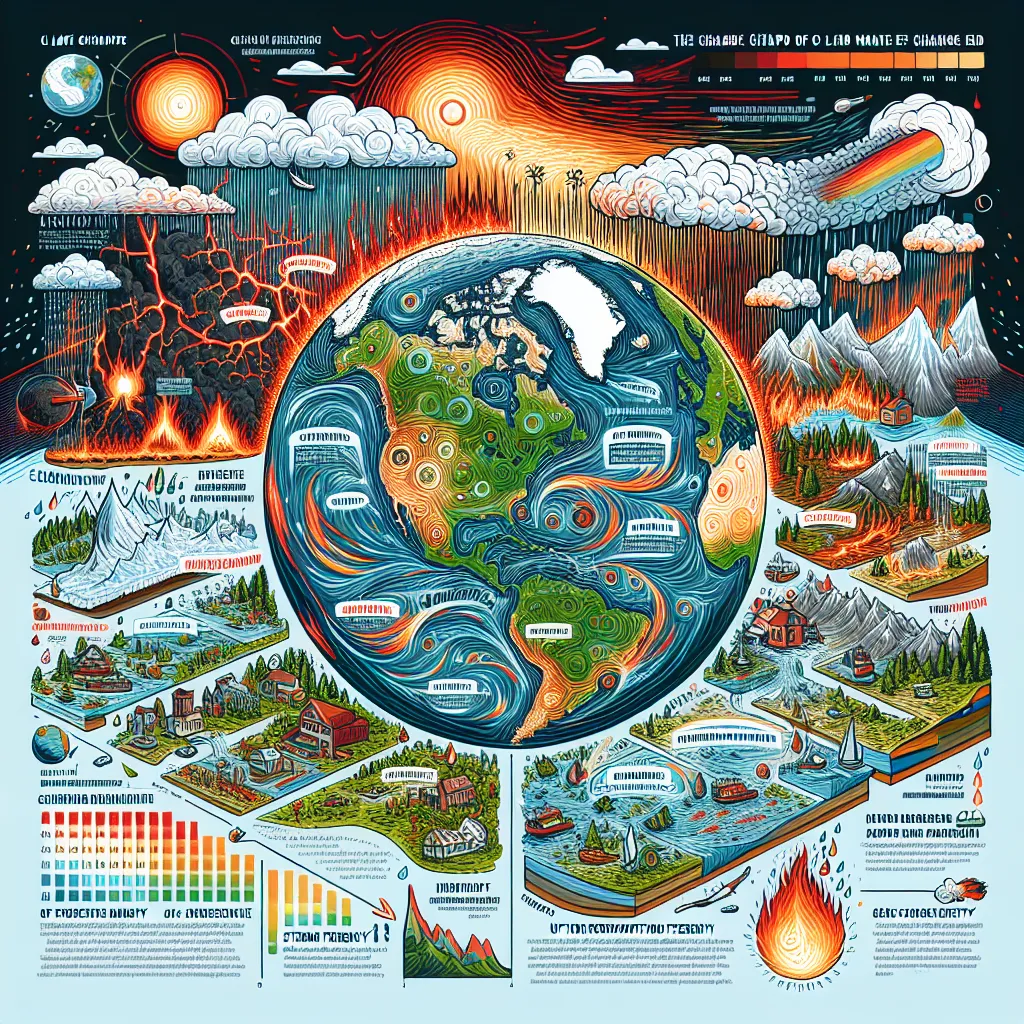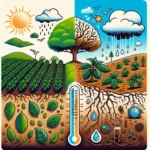The IELTS Reading section is a crucial component of the test, assessing your ability to comprehend complex texts and extract relevant information. Today, we’ll focus on a topic that has become increasingly prevalent in recent years: climate change’s effect on global weather patterns. This subject has appeared frequently in past IELTS exams and, given its ongoing relevance, is likely to feature in future tests as well.
Climate change and its impact on weather patterns is a pressing global issue that touches various aspects of our lives. As such, it’s an ideal topic for the IELTS Reading test, which often includes passages on environmental and scientific subjects. Let’s dive into a practice exercise that will help you prepare for this type of question in your upcoming IELTS exam.
Reading Passage
Climate Change: Reshaping Global Weather Patterns
Climate change is no longer a distant threat but a present reality that is reshaping weather patterns across the globe. As greenhouse gas emissions continue to rise, the Earth’s average temperature is increasing, leading to a cascade of effects that are altering long-established climate norms. This shift is not just about warmer temperatures; it’s about the fundamental reorganization of atmospheric and oceanic circulation patterns that govern our weather.
One of the most noticeable impacts of climate change on weather patterns is the increase in extreme weather events. Heatwaves, once considered rare occurrences, are becoming more frequent and intense. The summer of 2021 saw unprecedented heatwaves across North America, with temperatures in some regions soaring to nearly 50°C. Such extreme heat not only poses immediate health risks but also exacerbates drought conditions, leading to water shortages and increased wildfire risks.
Paradoxically, while some areas experience intense heat and drought, others are grappling with increased precipitation and flooding. This is because a warmer atmosphere can hold more moisture, leading to heavier rainfall events when that moisture is released. The devastating floods in Germany and Belgium in 2021 serve as stark examples of this phenomenon. These events highlight how climate change is intensifying the water cycle, making both floods and droughts more likely in different regions.
 Climate change effects on weather
Climate change effects on weather
The impact of climate change on global weather patterns extends beyond land. Ocean temperatures are rising, fueling more powerful tropical storms and hurricanes. Warmer waters provide more energy for these storms to intensify rapidly, potentially leading to more category 4 and 5 hurricanes. Moreover, rising sea levels, another consequence of climate change, amplify the destructive potential of storm surges associated with these cyclones.
Perhaps one of the most concerning aspects of climate change’s effect on weather patterns is the potential for abrupt and irreversible changes. The Arctic, warming at twice the global average rate, is experiencing rapid sea ice loss. This loss could disrupt the polar jet stream, a fast-moving air current that influences weather patterns across the Northern Hemisphere. A weakened or more erratic jet stream could lead to more persistent weather patterns, increasing the likelihood of prolonged heatwaves, cold spells, or periods of heavy rainfall.
The alteration of global weather patterns due to climate change has far-reaching implications. Agriculture, water resources, energy demand, and human health are all sectors that are highly sensitive to weather and climate. For instance, changing precipitation patterns can affect crop yields, potentially threatening food security in various regions. Similarly, more frequent heatwaves increase energy demand for cooling, straining power grids and potentially leading to blackouts.
As we grapple with these changes, adaptation and mitigation strategies become increasingly crucial. Enhancing early warning systems for extreme weather events, improving water management practices, and developing more resilient infrastructure are all important adaptation measures. However, the most effective way to limit future changes in weather patterns is to reduce greenhouse gas emissions dramatically. This requires a global effort to transition to renewable energy sources, improve energy efficiency, and protect and restore natural carbon sinks like forests and wetlands.
In conclusion, climate change is fundamentally altering global weather patterns, with impacts that are already being felt worldwide. As we move forward, understanding these changes and their implications will be crucial for policymakers, businesses, and individuals alike. The challenge of climate change demands both immediate action to reduce emissions and long-term planning to adapt to the changes that are already locked in. Our response to this challenge will shape the weather patterns – and indeed, the climate – that future generations will inherit.
Questions
True/False/Not Given
Determine if the following statements are True, False, or Not Given based on the information in the passage.
- Climate change is causing an increase in the frequency of extreme weather events.
- All regions of the world are experiencing increased drought conditions due to climate change.
- The summer of 2021 saw record-breaking heatwaves in North America.
- Rising ocean temperatures are leading to more category 1 and 2 hurricanes.
- The Arctic is warming at the same rate as the global average.
- Changes in weather patterns due to climate change could affect food security.
- Adaptation strategies are more important than mitigation efforts in addressing climate change.
Multiple Choice
Choose the correct letter, A, B, C, or D.
-
According to the passage, which of the following is NOT mentioned as an effect of climate change on weather patterns?
A) More frequent heatwaves
B) Increased precipitation in some areas
C) More powerful tropical storms
D) Decreased snowfall in all regions -
The passage suggests that the water cycle is intensifying due to climate change. This means:
A) All areas will experience more rainfall
B) Some areas will have more floods while others more droughts
C) The total amount of water on Earth is increasing
D) Oceans are becoming less salty -
What does the passage say about the polar jet stream?
A) It is becoming stronger due to climate change
B) Its disruption could lead to more persistent weather patterns
C) It only affects weather in the Arctic region
D) It is responsible for tropical storm formation
Matching Headings
Match the following headings to the correct paragraphs in the passage. There are more headings than paragraphs, so you will not use all of them.
- Paragraph 2
- Paragraph 4
- Paragraph 6
- Paragraph 8
Headings:
A) The paradox of extreme weather events
B) The role of greenhouse gases in climate change
C) Ocean warming and its consequences
D) The Arctic’s influence on global weather
E) Sectoral impacts of changing weather patterns
F) The importance of global cooperation in tackling climate change
G) Adapting to a changing climate
Summary Completion
Complete the summary below using words from the box. There are more words than spaces, so you will not use all of them.
Climate change is altering global weather patterns in several ways. It is causing more frequent and intense (15)__, as well as increased (16)__ in some areas. Ocean warming is leading to more powerful (17)__, while rising sea levels amplify the destructive potential of storm surges. The Arctic’s rapid warming could disrupt the (18)__, potentially causing more persistent weather patterns. These changes have significant implications for various sectors, including agriculture and energy. Both (19)__ and (20)__ strategies are crucial in addressing these challenges.
| heatwaves | floods | hurricanes | jet stream | adaptation | mitigation |
|---|---|---|---|---|---|
| droughts | storms | monsoons | trade winds | prevention | resilience |
Answer Key
- True
- False
- True
- False
- False
- True
- Not Given
- D
- B
- B
- A
- C
- E
- G
- heatwaves
- floods
- hurricanes
- jet stream
- adaptation
- mitigation
Explanations
-
True – The passage states, “One of the most noticeable impacts of climate change on weather patterns is the increase in extreme weather events.”
-
False – The passage mentions that while some areas experience drought, others face increased precipitation and flooding.
-
True – The text specifically mentions “The summer of 2021 saw unprecedented heatwaves across North America.”
-
False – The passage states that warmer waters lead to “more powerful tropical storms and hurricanes” and mentions “more category 4 and 5 hurricanes,” not category 1 and 2.
-
False – The passage states that the Arctic is “warming at twice the global average rate.”
-
True – The passage mentions that “changing precipitation patterns can affect crop yields, potentially threatening food security in various regions.”
-
Not Given – The passage discusses both adaptation and mitigation strategies but does not compare their importance.
-
D – The passage does not mention decreased snowfall in all regions as an effect of climate change.
-
B – The passage explains that climate change is intensifying the water cycle, leading to both floods and droughts in different regions.
-
B – The text states that disruption of the jet stream “could lead to more persistent weather patterns.”
11-14. The headings match the main ideas of the respective paragraphs.
15-20. These words complete the summary based on the information provided in the passage.
Common Mistakes to Avoid
- Overgeneralizing: Be careful not to assume that effects mentioned for one region apply globally.
- Misinterpreting “Not Given”: Remember, if the information isn’t explicitly stated in the passage, it’s “Not Given,” even if it seems logical.
- Overlooking key words: Pay attention to words like “all,” “some,” “more,” or “less” as they can change the meaning significantly.
- Falling for distractors: In multiple choice questions, some options may be partially correct. Always choose the most complete and accurate answer.
- Ignoring context: When matching headings or completing summaries, ensure your answers fit the context of the entire paragraph or passage.
Vocabulary
-
Greenhouse gas emissions (noun): Gases that trap heat in the Earth’s atmosphere, contributing to global warming.
Pronunciation: /ˈɡriːnhaʊs ɡæs ɪˈmɪʃənz/ -
Unprecedented (adjective): Never done or known before.
Pronunciation: /ʌnˈpresɪdentɪd/ -
Exacerbate (verb): To make a problem, bad situation, or negative feeling worse.
Pronunciation: /ɪɡˈzæsəbeɪt/ -
Paradoxically (adverb): In a seemingly absurd or self-contradictory way.
Pronunciation: /ˌpærəˈdɒksɪkli/ -
Amplify (verb): To increase the strength or amount of something.
Pronunciation: /ˈæmplɪfaɪ/ -
Abrupt (adjective): Sudden and unexpected.
Pronunciation: /əˈbrʌpt/ -
Mitigation (noun): The action of reducing the severity, seriousness, or painfulness of something.
Pronunciation: /ˌmɪtɪˈɡeɪʃən/
Grammar Focus
Passive Voice
The passage uses passive voice in several instances, which is common in academic and scientific writing. For example:
“As greenhouse gas emissions continue to rise, the Earth’s average temperature is increasing.”
This sentence could be rewritten in active voice as:
“Increasing greenhouse gas emissions are causing the Earth’s average temperature to rise.”
The passive voice is often used when the focus is on the action or result rather than the agent performing the action. It’s important to recognize and understand passive constructions in IELTS Reading passages.
Tips for IELTS Reading Success
-
Time management: Practice reading quickly while maintaining comprehension. Allocate your time wisely across all questions.
-
Skim and scan: Quickly skim the passage for main ideas, then scan for specific details when answering questions.
-
Pay attention to key words: Words like “however,” “although,” “despite,” often signal important information or contrasts.
-
Practice with diverse topics: Climate change is just one of many topics that might appear. Familiarize yourself with a wide range of subjects.
-
Improve your vocabulary: Regularly learn new words, especially those commonly used in academic and scientific contexts.
-
Read actively: Engage with the text by mentally summarizing paragraphs and predicting what might come next.
-
Don’t rely on prior knowledge: Base your answers solely on the information provided in the passage.
-
Check your answers: If time allows, review your answers to catch any careless mistakes.
Remember, consistent practice is key to improving your IELTS Reading score. Regular exposure to complex texts on various topics will enhance your reading speed and comprehension, preparing you for success on test day.
For more IELTS practice materials and tips, check out our related articles on how climate change is affecting global timber industries, the influence of climate change on the global coffee industry, and the effects of climate change on global food security.


